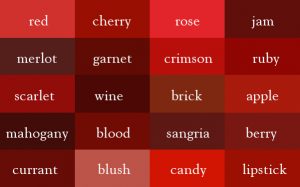 Red cues create the valuable red hues a speech needs to stand out in a speech contest. At our Divison A Toastmasters Conference yesterday I heard nine speakers deliver their best speeches and 5 of the nine were rainbow speeches. Amazing contest indeed and very difficult to pick a winner. What swayed the judges decision? The winning speech had the most powerful set of red cues that the speaker delicately sprinkled throughout her speech. This helped her get enough red emotion to boost her message without overpowering the other colors in her rainbow.
Red cues create the valuable red hues a speech needs to stand out in a speech contest. At our Divison A Toastmasters Conference yesterday I heard nine speakers deliver their best speeches and 5 of the nine were rainbow speeches. Amazing contest indeed and very difficult to pick a winner. What swayed the judges decision? The winning speech had the most powerful set of red cues that the speaker delicately sprinkled throughout her speech. This helped her get enough red emotion to boost her message without overpowering the other colors in her rainbow.
First what are red cues? Any emotionally charged words, phrases, or stories that signal or remind audiences to examine their own emotions. This is what gets the audience engaged with your speech and, as Carmen Simon writes in her book Impossible to Ignore,
You may be only as memorable as your cues.
Carmen Simon even highlighted in red the word “cues” in her statement since we associate red with love and hate and emotions that derive from those two extremes.


I have made a list of the various red cues used by the nine speakers I heard at the contest. Most speakers used several red cues and so the list is quite long. I have written them in no particular order of importance to show how vast the range of red cues can be.
a bullying boss, childhood rejection and solitude, a love of math, failing tests, a first love, burkini bans, a first broken heart, a childhood dream, a story of rescuing plane crash survivors in Andes, Mr Trump, love of flying, an Italian lover for a retired British teacher, the German invasion of France, Martin Luther King, terrorism by ISIS, the kindness of others, love of a mother, love of reading, arguing by email with a self-righteous troll, the Wright Brothers, Bataclan, a daring purchase made, mosque shooting, a test successfully passed…
Close your eyes and say any of these red cues out loud and watch the images and thoughts that form in your mind. You should see that just a few words can provoke a flood of images or, even better, personal stories in your mind. And this is what a rainbow speech needs as a base. While some of the words on the list may be more powerful for you than others, all have power to connect and affect the right audience. In Paris the word Bataclan evokes the whole tragedy of mass murder at the Bataclan theater, and yet the same word might evoke nothing in another city with another audience.
Just as the rainbow appears after the rain, a rainbow speech only happens when sparked by emotional stories from the past, whether of pain or pleasure. And this is where you can improve your rainbow. Do your stories use universal cues? Look at this list again. Which cues are the most universal? Which resonate the most with your audience? Can you find others which are not on the list and compare them to these ones? Rainbow speakers use universal cues which create a red response in their audience.
As a participant in the evaluation contest at the Division conference, I experienced the power of red cues first hand. Although I had spent most of the day toying with ideas for a fun gadget opening to my evaluation speech, I knew after the speaker’s first red cue “terminally ill” I had no chance of using a humorous evaluation approach. The next red cue The Ambulance Wish Foundation sparked a memory of a promise my wife and I made in 1999 to always support the Association Petits Princes, which makes wishes come true for children with life-threating illnesses. A promise made after our six-month-old son mysteriously “turned blue” due to lack of oxygen two days before Christmas 17 years ago. Although our son survived, the emotions and trauma of that period only needed the words “Ambulance Wish Foundation” to remind me of that period and promise. These red cues were so strong that I made a more personal and emotional evaluation than I had originally planned. I placed 2nd in the contest because I let those red cues move me, and my evaluation speech moved others in return. Remember next time you speak, you may be only as memorable as your cues.